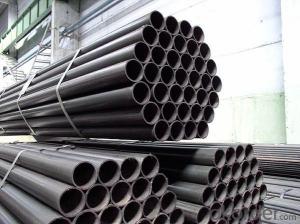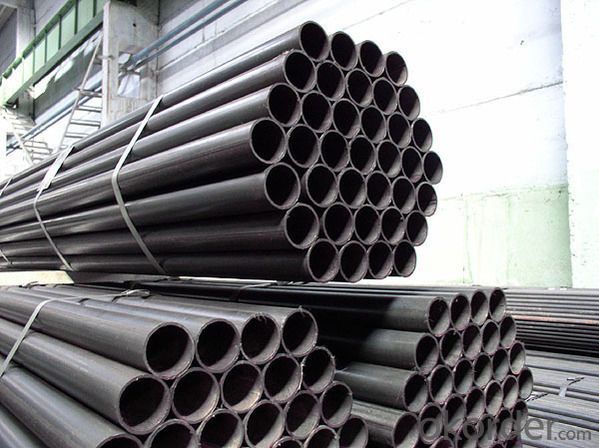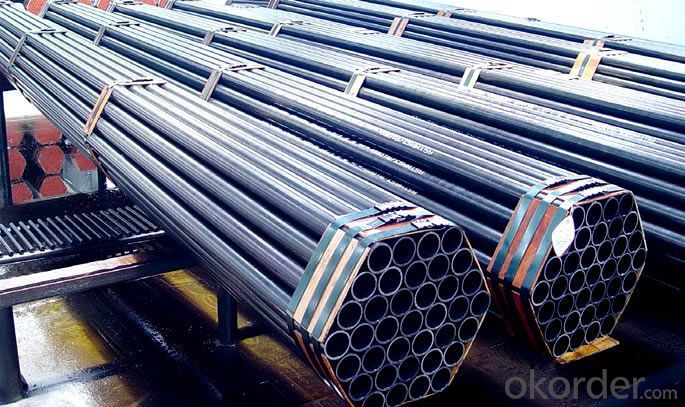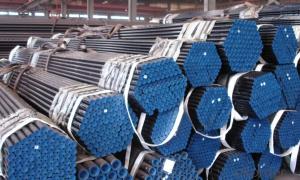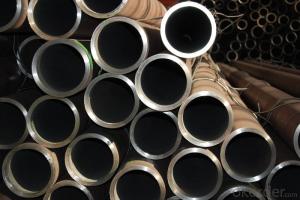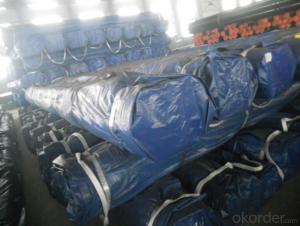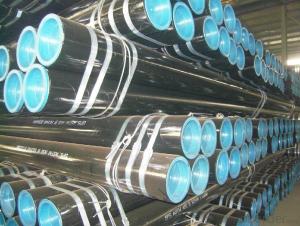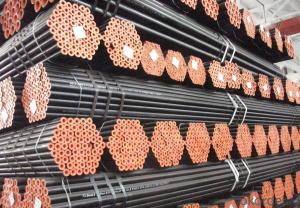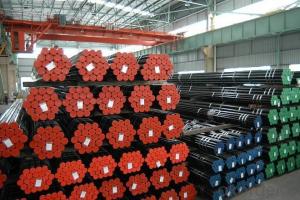Seamless Steel Pipe SCH40/80/STD Widely Used Multi Models
- Loading Port:
- Tianjin
- Payment Terms:
- TT or LC
- Min Order Qty:
- 100 m.t.
- Supply Capability:
- 1000 m.t./month
OKorder Service Pledge
OKorder Financial Service
You Might Also Like
Product Details:
1. Commodity Name: Carbon Seamless steel pipe
2. Standard: API,GB,ASTM,ASME,DIN
3. Quality grade: 10#, 20#, A106B, A53B, API 5L B, Q235, Q345, ST37-2, ST 45, ST52.etc.
4. Dimension:
OD: 1/2"-24"
WT: 2.5-80mm, SCH10~SCH40~XXL
Length: 5.8m,6m,8m,9m,12m
5. Technique: Hot Rolled/Cold Rolled/ Cold Drawn
6. Application:
Carbon seamless steel pipes are widely used in gas, water and oil, transpotation;constructions;Bridge,highway,windows of model steel door; building materials;fences;heating facilities Fluid Pipe;conduit pipe,scaffolding pipe.etc.
7. Payment Terms: L/C D/A D/P T/T
8. Packing and shipment
Packaged in bundles, and it can also be packagesd as beveled ends, typed marking, black painting, plastic caps protection,woven bags packing.
Packaging & Delivery
Packaging Details: | seaworthy package,bundles wrapped with strong steel strip |
Delivery Detail: | 15-30days after received 30%TT |
Seamless Steel Pipes Image
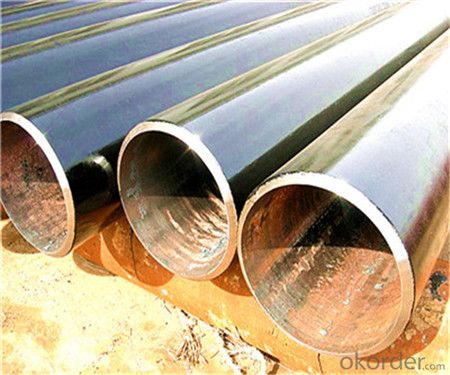
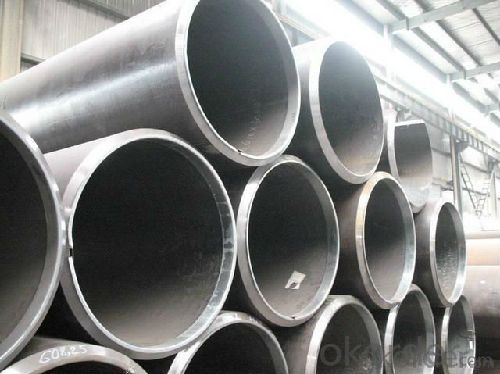
FAQ of Seamless Tube
①How is the quality of your products?
Our products are manufactured strictly according to national and internaional standard. If products’ quality don’t accord to discription as we give or the promise before you place order, we promise 100% refund.
②How about price?
We are factory and be able to give you lowest price below market one, and we have a policy that “ for saving time and absolutely honest business attitude, we quote as lowest as possible for any customer, and discount can be given according to quantity”.
③Why should you chose us?
Chose happens because of quality, then price, We can give you both.Additionally, we can also offer professional products inquiry, products knowledge train(for agents), smooth goods delivery, exellent customer solution proposals.Our service formula: good quality+good price+good service=customer’s trust
SGS test is available, customer inspection before shipping is welcome, third party inspection is no problem.
If you have any question, pls feel free to contact us !
- Q: What is the standard length of a steel pipe?
- The standard length of a steel pipe can vary depending on the application and industry, but commonly it ranges from 18 to 24 feet.
- Q: How much is the tube?
- The theoretical weight calculation formula of ordinary carbon steel tube is:The weight of each meter is kg/m= (outer diameter mm-, wall thickness mm) * wall thickness mm*0.02466For example: inventory 20# pipe diameter of 108*4.5 weight per meter:Kg/m= (108-4.5) *4.5*0.02466=11.485In accordance with the diameter of 108*4.5 steel pipe market price is 4500 yuan / ton as an example, we can know the diameter of 108*4.5 steel pipe per meter price: 11.485*4.5=51.68 yuan.
- Q: How do steel pipes handle thermal expansion and contraction?
- Steel pipes handle thermal expansion and contraction by allowing for slight movement and flexibility. When heated, the steel pipe expands, and when cooled, it contracts. To accommodate these changes, expansion joints or loops are often incorporated into the pipe system. These joints or loops allow the pipe to expand and contract without causing stress or damage. Additionally, proper insulation and support are essential to minimize the effects of thermal expansion and contraction on steel pipes.
- Q: How are steel pipes used in the manufacturing of chemical processing plants?
- Steel pipes are commonly used in the manufacturing of chemical processing plants due to their durability, high strength, and resistance to corrosion. These pipes are typically used for the transportation of various chemicals, gases, and liquids within the plant. They help maintain the integrity of the materials being processed and ensure the safe and efficient operation of the plant.
- Q: Can steel pipes be used for culvert applications?
- Indeed, culvert applications can utilize steel pipes. The utilization of steel pipes for culverts is widespread owing to their exceptional endurance, robustness, and immunity to corrosion. They possess the capability to endure substantial burdens, accommodate extensive traffic flow, and manage large water surges. Furthermore, steel pipes can be effortlessly fabricated in diverse dimensions and configurations to cater to specific culvert prerequisites. Their prolonged lifespan and minimal upkeep demands render them a cost-efficient alternative for culvert applications.
- Q: Are steel pipes suitable for use in acidic environments?
- No, steel pipes are generally not suitable for use in acidic environments because they are prone to corrosion in such conditions.
- Q: Can steel pipes be used for underground steam pipelines?
- Yes, steel pipes can be used for underground steam pipelines. Steel pipes are commonly used for various types of pipelines, including steam pipelines, due to their strong and durable nature. Steel pipes have the ability to withstand high temperatures and pressures, making them suitable for transporting steam underground. Additionally, steel pipes have excellent corrosion resistance properties, which is important for underground pipelines as they are exposed to moisture and potentially corrosive elements in the soil. Overall, steel pipes are a reliable and commonly used choice for underground steam pipelines.
- Q: Can steel pipes be used for conveying abrasive slurries?
- Yes, steel pipes can be used for conveying abrasive slurries. Steel pipes are known for their durability and strength, making them suitable for handling abrasive materials such as slurries. However, to ensure longevity and prevent excessive wear, it is important to select the appropriate grade of steel and consider factors such as pipe thickness, lining options, and flow velocity. Additionally, implementing proper maintenance and inspection procedures can help to detect and address any wear or corrosion that may occur over time.
- Q: DN150 welded steel tubes one meter multiple
- DN150 welded steel pipe according to the thickness of two specifications: outer diameter 165mm, wall thickness 4.5mm, 17.81Kg per meter weight, wall thickness of 5.5mm, 21.63Kg. per meter weight
- Q: Can steel pipes be used for transporting chemicals?
- Yes, steel pipes can be used for transporting chemicals. Steel pipes are known for their strength, durability, and resistance to corrosion, making them suitable for handling various chemicals. Additionally, steel pipes can withstand high pressure and temperature conditions, ensuring safe transportation of chemicals.
Send your message to us
Seamless Steel Pipe SCH40/80/STD Widely Used Multi Models
- Loading Port:
- Tianjin
- Payment Terms:
- TT or LC
- Min Order Qty:
- 100 m.t.
- Supply Capability:
- 1000 m.t./month
OKorder Service Pledge
OKorder Financial Service
Similar products
Hot products
Hot Searches
Related keywords
